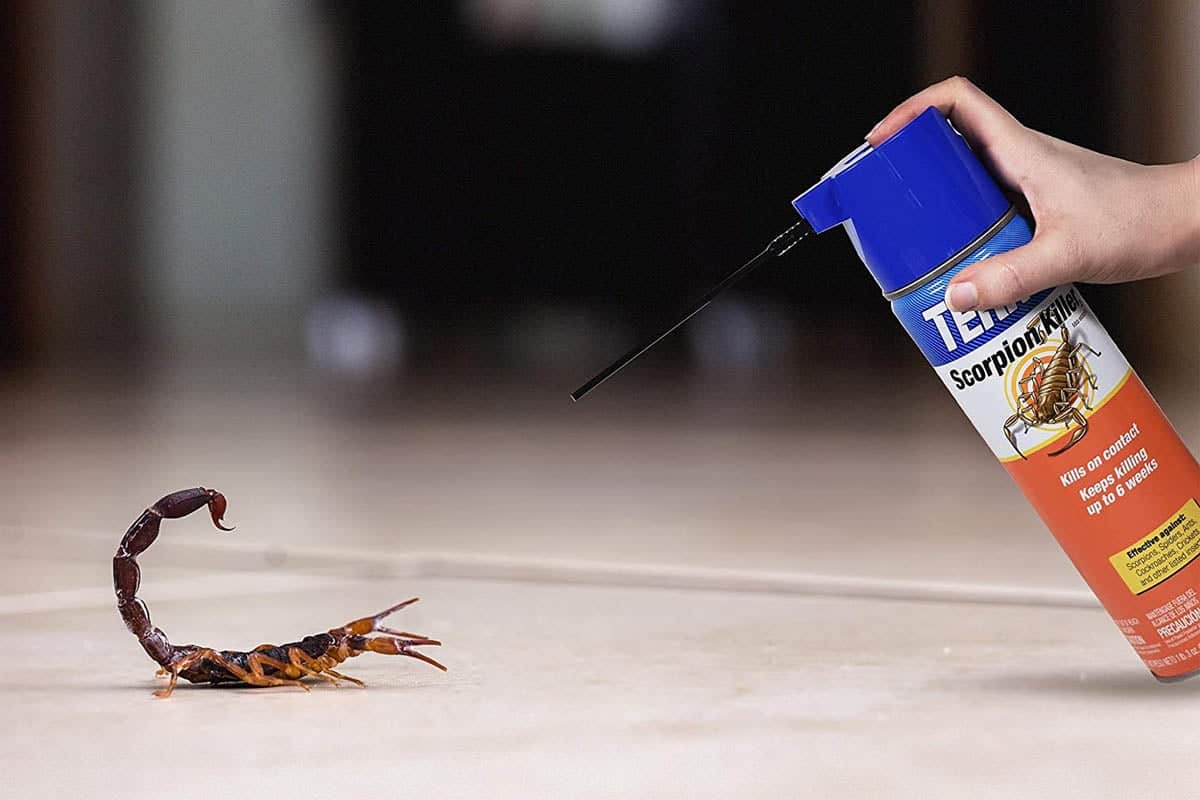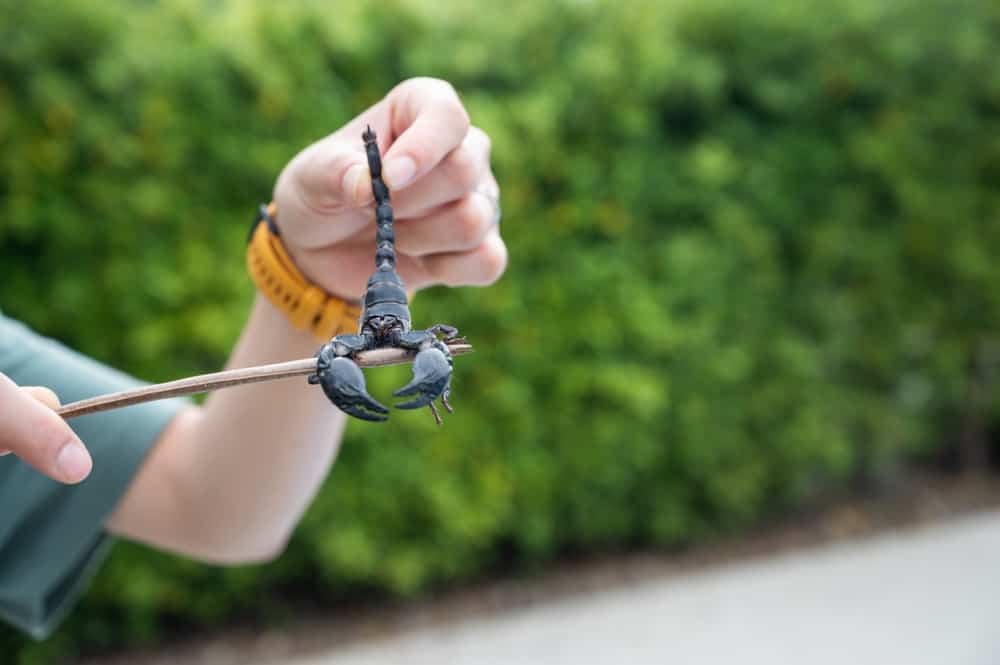No one wants to deal with a scorpion sting, and the idea of that pain is terrifying enough to have us seeing red the moment we spot a scorpion. Because of this, we have developed several ways to kill a scorpion.
The methods available to you range from squashing the scorpion to enlisting the help of chemical pesticides. One way or another, there’s a way to kill a scorpion that should work for you.
Keep reading as we explain the different ways to get rid of them before branching out into how you can prevent them in the first place.
Different Ways to Kill a Scorpion
Scorpions are venomous predatory arachnids, and some people may have qualms about going toe to toe with one. Other people are perfectly fine taking one out with a rolled up newspaper.
The most common methods for killing scorpions include:
- Squashing them
- Using pesticide sprays that kill on contact
- Enlisting the help of glue boards or other adhesives
- Powders like boric acid and diatomaceous earth
You may even have a companion that will go after the scorpion for you, but we recommend using one of the methods listed above to save them the trouble.
1. Squashing Scorpions
Unless insects, spiders, and other creepy crawlies make you uncomfortable, squashing a scorpion is the most direct way to take them out. It may also be instinct for you if your disdain is “on sight”.
We recommend squashing the scorpion with a shoe or other object that is heavy and large enough to cover them completely. Ideally, this isn’t something that you’re currently wearing.
If you’re in an area with frequent scorpion trespassers in the home, consider keeping a heavy duty fly swatter in problem areas.
2. Pesticide Sprays

Pesticide sprays are extremely effective and they’re made to kill on contact, but they can be a problem for those with pets or small children in the home.
Using one is straightforward. Make sure you aim the nozzle at the scorpion (not yourself) and douse the creature. For most sprays, the scorpion starts to die right in front of you.
We recommend opening windows when you use a pesticide spray to improve airflow and decrease inhalation of the poison. Once the scorpion is out of commission, pick it up off the ground and dispose of the body, then clean up the residue.
Remember to clean your hands and anything that may have come into contact with the pesticide afterward.
3. Glue Boards and Other Adhesives
Glue traps will not kill a scorpion, but they will catch them for you. While most involve a closed box, it’s still important to put them in areas where your children or animals cannot reach.
Another thing to understand about sticky traps is that they will trap other creatures. This may be fine for other pests, and smaller insects can even attract the scorpions for you, but it might be a compassion issue if you trap mice or snakes.
Some people prefer using adhesive to take care of a scorpion they meet out in the open. You can stick a piece of duct tape to a smaller scorpion, then simply fold it over and toss it out.
There are also adhesive bug wands that let you catch insects out of reach. Simply tap them with the end, dispose of the sheet they’re stuck to, and get on with your life. This is a more developed version of using a lint roller to trap the scorpion.
4. Boric Acid, Borax, and Diatomaceous Earth
Natural powders like boric acid (Borax under a different formulation) and diatomaceous earth are effective at controlling scorpion populations, but they kill slowly.
Boric acid works to chemically dehydrate the scorpion. During this slow death they can still sting you, and the powder can cause serious harm if inhaled or ingested by pets or others in the home.
Diatomaceous earth, which is made of fossilized diatoms, works similarly but is safer around the house. It works by cutting up the exoskeleton of insects and dehydrating them that way.
You can absolutely sprinkle either powder on a scorpion you see, but there’s no telling how long it will take for them to die. Instead, we recommend spreading the powder to create a contact barrier that will take out any that trespass without getting caught.
5. Scorpion Predators

Scorpions are predators themselves, but they’re hunted by many creatures.
Two of the most common pets you can keep that will happily deal with scorpions in your home including cats and chickens.
We don’t recommend recruiting these companions for pest control services because it’s not humane. They can get hurt, just like you, and you should have other reasons for keeping them in your home before viewing this as a benefit.
Should You Catch and Release Scorpions?
You don’t have to kill scorpions, and in some cases it’s better to catch and release the ones you find (or recruit someone else in the home to do it for you).
Scorpions are effective predators. While the venom in their stinger is a major reason you don’t want them near you, it’s what helps them keep other pests out of your home and yard.
To do this, use a jar or bowl large enough to cover them without cutting off any appendages. Scorpions don’t move fast, so you shouldn’t have a problem trapping them underneath.
Slide heavy cardstock or construction paper underneath the container, then flip it over to send them to the bottom. Move quickly to take this outside and release them far from your home.
Essential Oils vs Scorpions
Many prefer essential oils for a more natural approach to pest control in their home. One of the most popular mixes for deterring scorpions uses a few drops of lavender oil and cedar wood in a spray bottle.
While this may smell great, it’s not the most effective. This Solid State Technology study shows that citrus oils (specifically grapefruit and sweet orange) are more effective than others spread on the internet.
These won’t kill scorpions, but they can deter them from entering your home.
Basic Housekeeping for Scorpion Prevention and Safety
Keeping your house and yard picked up is most effective at preventing scorpions, and there are some basic tips that can keep you safe. This involves:
- Picking up clutter inside and outside (i.e. clothes, towels, stacks of wood, piles of leaves)
- Wearing protective clothing outside (specifically gloves when working and shoes at night)
- Reducing moisture (i.e. leaks, dampened debris, monitoring bodies of water, cleaning up spills)
- Sealing up cracks and gaps
- Keeping other pets in control
If you have a major problem, treat by mixing an effective pesticide and using a sprayer to apply. You can use it straight on problem areas or apply it to burlap or cloth to surround areas you cannot remove.
Keep Clutter Picked Up
Make sure you don’t leave things out in your home, particularly shoes and clothing. If you do, make sure you shake them out before putting them on or away.
Clutter in your yard provides several hiding places for scorpions, and they will eventually make their way inside after settling in. Make sure you remove:
- Trash
- Woodpiles
- Stones
- Clutter around the foundation of your home
Prune your tree branches, especially those that touch or hang over the house, and only bring firewood in as you need it. Wear gloves and long sleeves while you work, and inspect pieces for scorpions to stay safe.
A clean lawn is one of the most effective ways to control scorpions in your area.
Reduce Moisture
Scorpions are attracted to water sources. While you can’t get rid of your pool and you shouldn’t have to part with bird baths, it’s important to understand that they may be around these areas and set up a proper barrier.
Beyond this, do your best to reduce humidity in your home. Fix any leaks or drips as soon as you notice them, and use dehumidifiers and exhaust fans as needed.
Seal Up Cracks and Gaps
Some scorpions can fit into gaps as narrow as a credit card, so you must be meticulous in sealing them up and spraying these areas.
Ensure all obvious entry points, including doors and window frames, have proper weatherstripping. You can also spray these areas to prevent scorpions from even thinking about crossing over.
Smaller cracks and crevices, which are common around your basement and foundation, benefit from a spray of insecticide and some caulk to seal them up. Check regularly to make sure they are still sealed.
Keep Other Pests Under Control
Smaller prey, including ticks, mites, and crickets, will attract scorpions to your home if their population gets out of control. Eventually, your insect problem could evolve into a scorpion infestation as well.
On top of limiting water, make sure you use the proper insecticide to keep these populations in control. Limit outside light that attracts them and keeps them active, and you may never see another scorpion again.
Conclusion
Killing scorpions is not a difficult task, but you may want to recruit professional help if you have a major issue or little time to deal with it. A single visit often costs less than you think, and it can get rid of the problem in a timely manner.
If you’re treating on your own, make sure you take the proper precautions. Wear protective clothing, follow all label instructions, and focus on prevention for the future.
Comment with any questions or concerns you have regarding scorpions in your home!
